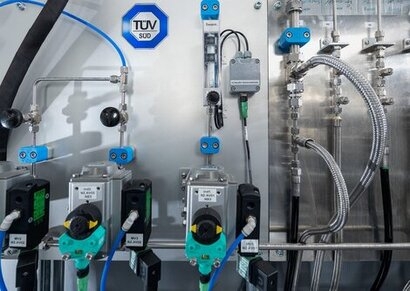
Since May 2022, TÜV SÜD Product Service has offered two new voluntary certification marks, “Fuel cell system” and “Hydrogen system component”, for stationary, factory-made fuel-cell systems and hydrogen-carrying components respectively. While fuel cells produce electricity based on an electrochemical reaction, hydrogen-carrying components such as valves, fuelling nozzles, breakaway couplings and hoses are used at H2 (re)fuelling stations or on H2 vehicles. By affixing the certification mark of the independent TIC company to their products, manufacturers communicate their quality and safety awareness to purchasing agents and consumers, but also gain competitive edge. The normative basis comprises IEC 62282-2 and -4 for fuel-cell modules, IEC 62282-3 for fuel-cell systems, ISO 19880-3 and -5 for hydrogen valves and dispenser hoses and ISO 17268 for breakaway couplings and fuelling nozzles.
Certification confirms more than the products’ or systems’ conformity with the national and international technical safety standards. Where necessary, TÜV SÜD also inspects the production factory and performs regular surveillance audits. In Garching near Munich, TÜV SÜD operates a cutting-edge hydrogen testing laboratory where components and systems are tested for their H2 readiness, compatibility and performance, from design validation to type approval and certification.
“Fuel cells and hydrogen offer the opportunity to effectively reduce emissions in industrial and consumer goods, in the transport sector and in energy production” said Martin Sekura, Hydrogen Business Development Manager at TÜV SÜD. “Case studies from steelworks show that customers are increasingly willing to pay higher prices if this energy carrier is used to improve the carbon footprint.”
Certification of fuel cells and hydrogen components has not been required by law in the majority of cases to date. However, the planned recast of the Alternative Fuels Infrastructure Regulation (AFIR) might change this in the medium term. By expanding the infrastructure for alternative fuels, the European Union is creating opportunities to effectively drive decarbonisation.
“Our voluntary certifications enable their holders to leave a mark and already promote sustainability today, keeping us one step ahead of development” added Mr Sekura.
For additional information:

